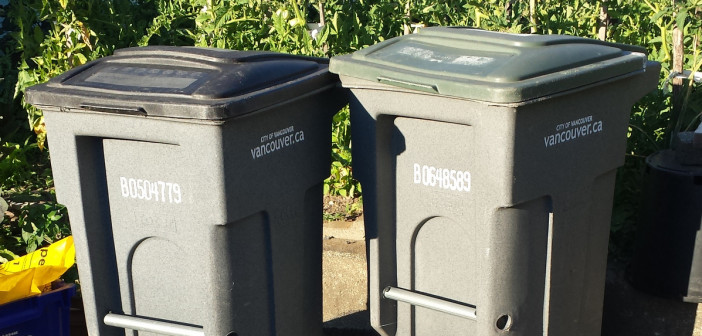Metro Vancouver and member municipalities are proceeding with the organics disposal ban.
Like other bans, it will be applied at Metro Vancouver facilities.
We encourage food scraps recycling because it’s the right thing to do, it takes waste out of our landfills, it reduces our methane contributions, and it creates compost and bio-energy.
Metro Vancouver has developed this two minute video to explain the introduction of the new food scraps recycling rules. Available in English, French, Japanese, Mandarin, Punjabi, Tagalog and Korean.
The grace period is almost over for people and businesses in Metro Vancouver who continue to put food scraps in the garbage.
July 1 is when fines will be levied for improperly disposed-of food waste.
The policy actually went into effect in January, but Metro Vancouver wanted to give folks and companies time to put new garbage systems in place.
Andrew Marr, Director of Solid Waste Programming, says they will be keeping track of how much food is winding up in normal garbage loads.
“We will start putting surcharges on loads of waste when they come to our disposal sites. If a load has more than 25 per cent food waste by volume then it will be surcharged,” he explains.
The surcharge will be an additional 50 per cent of the cost of the disposal. For example, a $100 load will cost $150 with the additional surcharge.
Garbage companies will be paying the fine up front, since they are the ones depositing the waste. But Marr says those companies can figure out where the food has come from and pass on that extra expense.
“Some haulers have said to us they have a good idea of who the likely sources of organic waste are. There is certain logic to that. They know which businesses on their route produce food waste.”
Those likely sources are restaurants and grocery stores.
Whether the food waste ratio will be tightened from 25 per cent of a load, down to say 10 per cent, over the next few years has yet to be decided.
Marr says casual inspections of garbage loads over the last six months have revealed 99 per cent of garbage loads had acceptable levels of food waste.
He points out zero-food-waste policies are in effect in many places in the world such as Halifax, whose ban is already 17 years old.
As for when we’ll see food waste bins in schools, community centres, churches and other public facilities, Marr says it’s only a matter of time before the bins become mainstream.
MAGBABAGO ANG PARAAN NG ATING PAMAMAHALA SA BASURA
Sama-sama nating ihiwalay ang mga tiráng pagkain sa ating basura. Ang paraan ng ating pamamahala sa basura ay magbabago. Simula sa 2015 kailangan mong ihiwalay ang mga tiráng pagkain mula sa karaniwang basura.
Ang Metro Vancouver ay naglabas ng panuntunang ito nang sa gayon ang mga organikong bagay (pangunahín ang mga tiráng pagkain) ay dapat nakahiwalay sa mga karaniwang basura, at kukolektahin para sa biofuel (o organikong pagkukunan ng enerhiya). Ang mga pwedeng kainin na nakakalusog na pagkain ay maaaring isaalang-alang para sa donasyon.
Karaniwang mga bagay na compostable (o maaring pangpataba ng lupa o ng halaman) ay kinabibilangan ng:
- Gulay at prutas
- Hilaw na pagkain, mga tiráng pagkain
- Naka-package na pagkain (alisin sa package)
- Karne, isda, mga buto at mga pinagbalatan (shells) ng pagkaing-dagat o seafood
- Pasta, tinapay at kanin
- Produktong mula sa gatas, eggshells, mga sawsawan (sauce) at mga sarsa
- Papel na karton ng itlog
- Paper towels, unlined na mga paper cup/plato
- Mamantikang napkins at mga kahon ng pizza/ mga pahayagan
- Kraft paper/mga supot na papel na ginagamit upang kolektahin ang mga tiráng pagkain
- Waxed na mga kahóng karton
- Sapal ng kape/filters at tea ccbags
- Mga kagamitan tulad ng chopsticks, stir sticks and toothpicks.




